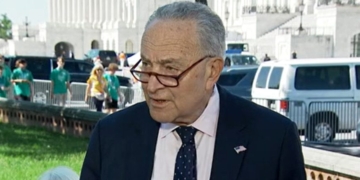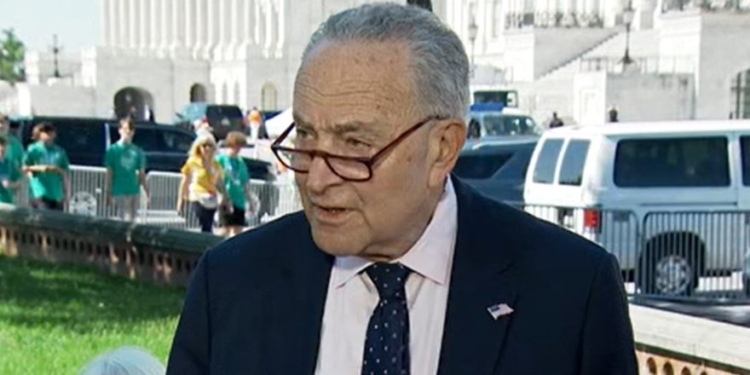Liberal political operatives and Democratic campaigns spent roughly half a billion dollars trying to win Senate races that they ultimately lost by considerable margins.
Democratic campaigns and the political committees supporting them spent over $495 million on Senate races in Texas, Montana, Ohio, Florida and Missouri, campaign finance filings show. In each case, Republicans are on track to win by at least four points, according to The New York Times.
The bulk of the spending that went toward supporting the slate of failed Democratic candidates bankrolled a flood of advertisements on TV, radio and the internet, disclosures show.
Ohio was the most expensive loss of the five races, with Democratic Sen. Sherrod Brown and allied groups spending roughly $194 million on operations designed to either oppose Republican Senator-elect Bernie Moreno or to support the incumbent senator, campaign finance records show. As of Nov. 8, with over 95% of votes counted, Moreno leads Brown by about four points, or 200,000 votes, the NYT reported.
Brown sought to bolster his reputation among blue collar voters by cutting multiple ads centering around factory workers and attacking outsourcing to China, with the senator often wearing working-class clothing while appearing in them. His ads attacking Moreno criticized his pro-life beliefs and claimed that he wants to criminalize abortion in cases of rape.
Moreno at one point said that he was “100% pro-life with no exceptions” but campaigned on a 15-week abortion ban with exceptions for rape, incest and the life of the mother, according to PolitiFact.
While running in a state President-elect Donald Trump carried handily in 2016 and 2020, Brown sought to portray himself as a bipartisan willing to work with Republicans in his advertisements. The senator voted with President Joe Biden 97.9% of the time in 2023, according to an ABC News analysis.
Democrats also spent big trying to save incumbent Democratic Montana Sen. Jon Tester, whose state elected Trump over Biden by a margin of over 16 points in 2020. Between Tester’s campaign and the outside groups supporting him, nearly $160 million was spent trying to keep his seat under Democratic control, according to campaign finance disclosures. Despite the spending, Montanans chose Senator-elect Tim Sheehy by a margin of around eight points, the NYT reported.
Tester, similar to Brown, stressed his blue collar clout in advertisements by wearing work jackets and highlighting his occupation as a farmer. He also embraced a rural identity in his ads, pointing toward his efforts to expand high-speed internet and improve infrastructure in Montana.
Like Brown, Tester voted with Biden about 95% of the time, according to ABC News. One of the outside groups supporting Tester, the American Bankers Association, produced an ad that attempted to paint him as fiscally conservative, pointing toward his support for a bill that loosened banking regulations.
Aside from trying to defend vulnerable incumbents, the Democratic Party and its allies also made expensive plays to oust Republicans from what they believed to be competitive seats. Despite efforts from Democrats, no Republican senators lost reelection on Tuesday.
Texas was the most expensive of these failures for Democrats, with Democratic Rep. Colin Allred’s campaign and its allied groups spending about $92 million attempting to unseat Republican Sen. Ted Cruz, campaign finance records show. While polling was at some point competitive in Ohio and Montana, Allred never took the lead over Cruz in 2024, according to FiveThirtyEight’s polling averages.
Cruz and his allies, by comparison, spent about $87 million on the Senate race, according to campaign finance records.
Allred’s campaign, utilizing the massive quantity of money behind it, attacked Cruz for being too soft on border security, citing the senator’s refusal to back the Biden-endorsed border bill and Allred’s condemnation of Biden’s border policy in early 2024. His campaign’s ads also hit on kitchen-table economic issues and highlighted his career as a professional football player.
During the final weeks of the campaign, however, Allred was caught on his back foot, spending ad money to deny claims that he supported allowing biological males to play in girls’ sports after the Cruz campaign launched an advertising blitz claiming as much.
“Ted Cruz is lying again, but now he’s lying about our children,” Allred said in the ad. “I’m a dad, I’m also a Christian. My faith has taught me that all kids are God’s kids. So let me be clear: I don’t want boys playing girls’ sports or any of this ridiculous stuff Ted Cruz is saying.”
Allred, however, had been a vocal opponent of laws banning biological males from girls’ sports and supported legislation that would have forced public schools to let men who identify as transgender women join girls’ sports teams.
Cruz ultimately defeated Allred by about nine points, according to the NYT.
Democrats and their allies also spent about $51 million trying to flip Senate seats in the deep red states of Florida and Missouri by pushing for attorney Lucas Kunce and former U.S. representative Debbie Mucarsel-Powell, respectively. Both candidates lost by over 10 points, according to the NYT.
It’s not clear that the amount of money spent was what prevented Democrats from achieving broad success in the elections Tuesday. Harris, for instance, out-raised Trump by a margin of nearly three-to-one with a campaign haul of approximately $1 billion, and outside groups engaged in a massive half-billion dollar spending blitz during the final month of the race, totally eclipsing spending from pro-Trump groups.
The Democratic Senatorial Campaign Committee as well as the Allred, Tester, Brown, Powell and Kunce campaigns did not immediately respond to the Daily Caller News Foundation’s requests for comment.
All content created by the Daily Caller News Foundation, an independent and nonpartisan newswire service, is available without charge to any legitimate news publisher that can provide a large audience. All republished articles must include our logo, our reporter’s byline and their DCNF affiliation. For any questions about our guidelines or partnering with us, please contact [email protected].



























 Continue with Google
Continue with Google